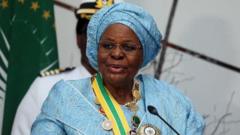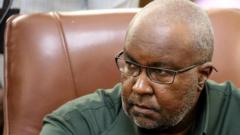In a groundbreaking announcement, Namibian President Netumbo Nandi-Ndaitwah disclosed plans to abolish university fees by 2026 during her inaugural state of the nation address. The initiative aims to provide financial relief to students, as they will no longer be responsible for registration or tuition fees at public universities and technical colleges. Only costs related to accommodation and other necessities will fall on students and families for now.
While the announcement has been met with excitement from some student groups, it has also sparked skepticism regarding its viability. Critics, including the Affirmative Repositioning Student Command (ARSC), labeled it as a mere publicity stunt lacking a clear funding plan. There are concerns about potential restrictions on who will benefit from this initiative, with questions raised about whether it will apply solely to undergraduates or include post-graduate students as well.
Funding for the free education program is expected to come from existing university subsidies and student assistance funds, but concerns persist regarding the adequacy of these resources. Experts echo the sentiment that without additional funding, there could be limitations imposed on student enrollment numbers, similar to challenges faced in South Africa following their own #FeesMustFall movement.
As Namibia embarks on this ambitious plan, the implications for educational access and equity remain to be seen, especially for middle-income families who may still struggle with educational costs despite the promise of free tuition.
While the announcement has been met with excitement from some student groups, it has also sparked skepticism regarding its viability. Critics, including the Affirmative Repositioning Student Command (ARSC), labeled it as a mere publicity stunt lacking a clear funding plan. There are concerns about potential restrictions on who will benefit from this initiative, with questions raised about whether it will apply solely to undergraduates or include post-graduate students as well.
Funding for the free education program is expected to come from existing university subsidies and student assistance funds, but concerns persist regarding the adequacy of these resources. Experts echo the sentiment that without additional funding, there could be limitations imposed on student enrollment numbers, similar to challenges faced in South Africa following their own #FeesMustFall movement.
As Namibia embarks on this ambitious plan, the implications for educational access and equity remain to be seen, especially for middle-income families who may still struggle with educational costs despite the promise of free tuition.



















